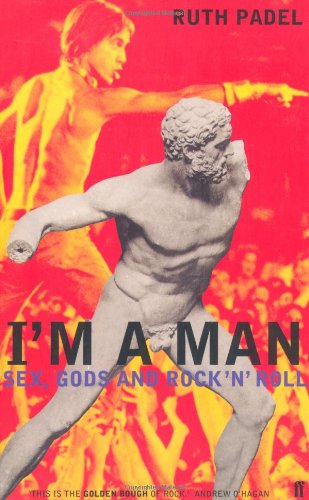Rock music is like religion: it’s something you grow out of. And then later, wiser maybe, you grow back into it. Guys take it very seriously, like religion (think “Clapton is God” scrawled on the walls of the London Underground). Ruth Padel grew into it late and takes it seriously. As a young woman she played chamber music with her family, studied Classics, wrote poetry – and so her stance in this study of white rock and its relation to black music and Western masculinity is that of the cultured outsider.
“I’m a Man,” Padel confides in her title, but she isn’t and that’s a bit of a problem. Many of her ideas about maleness are built on the ideas of other women about maleness (Greer, de Beauvoir, Froma Zeitlin). She says: “Men hide behind shiny desks, shiny cars, Armani suits, swaggery rhetoric, technical know-how, displays of knowledge, intimations of enormous salaries, myths of being hard.”
Is that likely to be true of, say, some of the male friends Padel mentions in her Acknowledgements – the journalist Andy O’Hagan, the novelist Colm Tóibín, the poets Michael Donaghy and Don Paterson? In a reasonable quest to show that the idea of femininity is a male invention, this kind of writing is in danger of constructing an equally skewed myth about masculinity.
Nevertheless, Padel’s articulate erudition wins through, and she says something true or memorable on almost every page. Taking us to a time before the rise of the first great black-impersonators, Elvis Presley and Mick Jagger, she explains the influence of, for example, Robert Johnson, the 1930s black blues king who used to play guitar with his back to the audience so that no one could copy his finger-work. Keith Richards sat in Brian Jones’s bedsit listening to Johnson records. Eric Clapton said of Johnson: ‘His music is the most powerful cry I think you can find in the human voice.’
It’s hard to give a feel for the scope of this book. To concentrate on just one.or two points would not do it justice. For example, Padel exploits her classical background to examine rock music through the prism of Greek myth. At times she wants to say that rock and Western masculinity have their roots in Ancient Greek culture. This may be true, but many will feel that things have changed in the last two and a half thousand years. At other times it seems to be just an ingenious—often useful—way of looking at her subject.
She relates the white man’s theft of black music to Prometheus’s theft of fire. Ingenious. How useful? She presents guitar solos in terms of a rock equivalent for the Homeric aristeia—the fifteen or so minutes mid-battle when a warrior might enter a martial state of grace, going it alone, butchering hundreds, qualifying as a hero. In a similar way the soloist says: “And this is what I can do.” Ingenious, and, I think, useful.
But, if she was going to talk about myths, she needn’t have limited herself to Greek ones. She might, for example, have referred us to Enkidu, the hairy shepherd-musician of the Epic of Gilgamesh (older than The Iliad), as a prototype rock star. She might have related her topic to the Iron John myth (as recorded by the German brothers Grimm), and thereby presented her earnest rock musician as a kind of surrogate father to his hordes of boy-fans.
You can’t mention everything, I suppose. And Padel doesn’t waste her pages. She explores, among other things, the darker corners of rock history. We read about the consequences of Mick Jagger’s flirtation with Satanism at Altamont in 1969, when he wrapped himself in a cloak to sing ‘Sympathy for the Devil’: during the concert, the Bay Area Angels who had been hired to protect the stage knifed a black man to death. We learn how Henry Rollins, of the Eighties American punk band Black Flag, became obsessed with the character of multiple-murderer Charles Manson.
In healthier passages, there are discussions of the heavy talents of Jimi Hendrix and Bob Dylan. Padel sets out the paradox of (rock) fame: the fact that the more the public identify with you, and the more rich and famous you subsequently become, the further removed from the public you actually are. Jim Morrison crossed this divide by hurling himself into the crowd at concerts. Punks encouraged their fans to spit on them.
Padel ends up with an intelligent book about a popular subject, although it probably needs a sub-sub-title if anyone is to guess from its cover exactly what it is about. It contains a vast amount of knowledge (about Greek culture and every form of music) pinned down by sane opinions, and is written in a prose that shifts smoothly from the trendy and readable to the poetic and passionate. Ruth Padel’s position as outsider proves an excellent vantage point.

